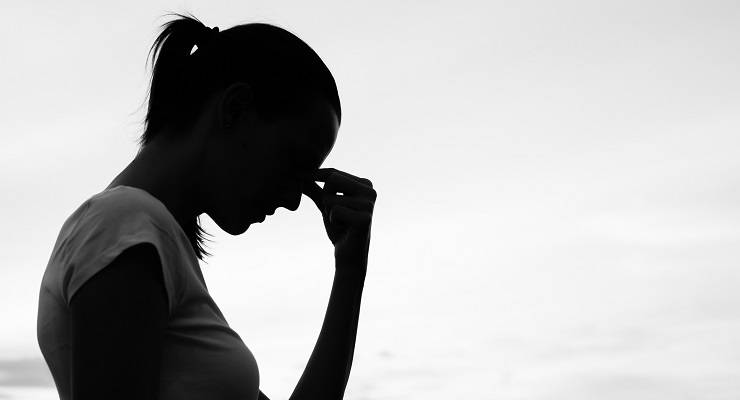
Increased irritability with people around you. Fear of stepping outside. A fragmented, disrupted sleep pattern punctuated by particularly vivid and unusual dreams.
All of these are early signs that isolation may be getting under your skin, says Dr Michael Musker, a senior research fellow in mental health and wellbeing at the South Australian Health and Medical Research Institute. For many, this period will bring heightened incidents of anxiety. Others might see their mental health deteriorate, and become diagnosed with clinical depression.
Musker says this anxiety will manifest itself differently for different people.
“People become a little agitated. In the shops, some people are looking at each other with fear, almost like a competitor.”
All of that unease is exacerbated by the sense of uncertainty that comes when people’s routines are upended by the realities of working from home and the loss of social contact.
“People’s days are going to be completely thrown out. You’re going to sleep in, you’re going to stay up later,” Musker says.
“And that also affects your mood. People’s sleep pattern will change, they’ll become irritable. We’re not going to eat well. For some people the first thing for comfort is to overeat.
“Some people will maybe burst into tears, some may even become more quiet. Others will stay home and drink, and possibly drink themselves into oblivion.”
A catch-22
The current pandemic poses another unique problem. Poor sleep, irritability and anxiety are, in some ways, the natural impact of a once-in-a generation crisis. But at what point do those responses cross the line into clinical depression?
Pat McGorry, executive director of youth mental health organisation Orygen, and one of Australia’s leading experts in the field, warns that we should be careful not to “over-pathologise” the whole population.
“The interesting thing about this disaster is that it’s affecting the whole population — no one’s immune,” McGorry says.
“When you have a major stressor or trauma, it is a risk factor. All disasters increase the percentage of people who need treatment. But most reactions aren’t pathological, and don’t cause them to become ill.”
McGorry says that while inability to sleep, increased irritability, and bouts of anger may be normal in this climate, they could be signs someone is developing depression, if they continue and get deeper.
A bigger, badder health crisis
Over the past week and a half, Australia’s epidemic curve has been trending down from its peak in March. Across the Easter weekend, there were less than 50 new cases recorded each day nationwide. But McGorry warns that mental ill-health could become the other major peak.
“The government is so preoccupied with the main game at the moment that they might not get in a position to deal with it in time.”
Like the virus, the mental health impact will be felt hardest among particular groups of people. Those with pre-existing mental health issues, around 20% of the Australian population, could see their conditions worsen.
That might mean more hypomanic episodes for people with bipolar disorder, or a relapse for people rebounding from depression.
According to McGorry, young people, already more vulnerable to mental health issues and now forced to sacrifice economic security and a social life to protect their elders from the virus, will be particularly at risk. So too will older Australians, already living more isolated lives, now robbed of crucial contact with their children and grandchildren. People living in rural and regional areas, with far less access to mental health services, are also at great risk.
The long term impacts
What might this all mean in the long term? Long before we went into lockdown, governments and health experts were talking about a loneliness crisis. Loneliness can shorten life spans, and increase vulnerability to physical and mental illness — one study found it has the same impact on heart disease as smoking 15 cigarettes a day. This period of indefinite social isolation could expose more Australians to the health effects of loneliness.
And all this will likely be exacerbated by a prolonged period of economic uncertainty. During the Great Depression, the suicide rate rose along with unemployment. More extreme health conditions like schizophrenia worsened. As the economy sputters, even with government assistance, there could be a snowball effect on people’s mental health.
And for many, habits will be forever changed. Like our ancestors who lived through the Depression and World Wars, some of us might never stop stockpiling, even in times of abundance. Musker suggests germophobia might be cemented into our psyche for the rest of our lives. This weekend Anthony Fauci, one of the doctors leading America’s response to the pandemic, suggested we might never shake hands again.
Most Australians won’t get COVID-19. But we could still emerge from the crisis an altogether sicker nation.








Crikey is committed to hosting lively discussions. Help us keep the conversation useful, interesting and welcoming. We aim to publish comments quickly in the interest of promoting robust conversation, but we’re a small team and we deploy filters to protect against legal risk. Occasionally your comment may be held up while we review, but we’re working as fast as we can to keep the conversation rolling.
The Crikey comment section is members-only content. Please subscribe to leave a comment.
The Crikey comment section is members-only content. Please login to leave a comment.